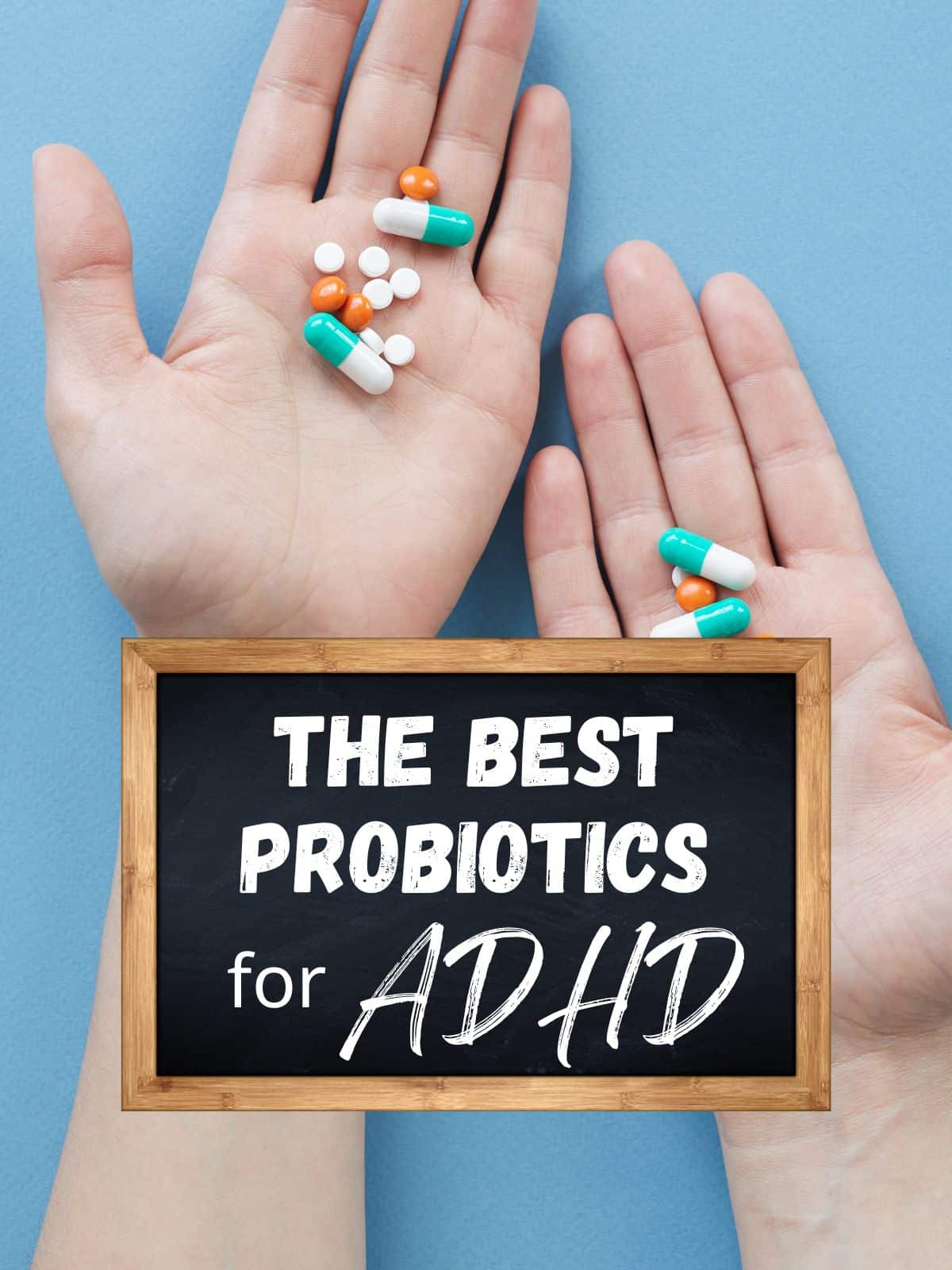The content on this website is for informational purposes only and is not meant to replace professional or medical advice. See our full disclaimer.
Today, we're talking about probiotics, prebiotics, and how they could be game-changers for managing ADHD symptoms. Get ready to dive deep into the world of gut health and explore the best probiotics for ADHD (and how they can potentially improve symptoms of ADHD and your mental health)!
Jump to:
Why Probiotics Can Improve ADHD Symptoms
Probiotics are the friendly bacteria living in your gut. You can find them in foods like yogurt and sauerkraut, as well as in supplements. They help with everything from digesting food to producing essential vitamins and balancing your immune system.
The connection between our gut and ADHD brain is a hot topic in research. This connection, known as the gut-brain axis, means that changes in our gut can influence our brain and vice versa. It's this gut-brain connection that is thought to play a role in a range of neuropsychiatric disorders, including ADHD. 1Cenit, M. C., Sanz, Y., & Codoñer-Franch, P. (2017). Influence of gut microbiota on neuropsychiatric disorders. World Journal of Gastroenterology, 23(30), 5486-5498.
Research shows that folks with ADHD often have a different gut microbiota (that's the community of microbes in your gut) compared to those without ADHD. 2Prehn-Kristensen, A., Zimmermann, A., Tittmann, L., Lieb, W., Schreiber, S., Baving, L., & Fischer, A. (2018). Reduced microbiome alpha diversity in young patients with ADHD. PloS one, 13(7), e0200728. The good news is that by helping to restore a healthy gut environment, probiotic use could potentially improve ADHD symptoms, like focus, hyperactivity, and impulsivity.
Now we all know nothing can "cure" ADHD, but most of us ADHDers will try anything to see some improvement.
The Best Probiotics for ADHD and How to Take Them
The world of probiotics is a bit like a bustling city - each strain of bacteria has its unique strengths. Some strains might be particularly good for gut health and, in turn, could be helpful for managing ADHD symptoms.
There are different ways to add probiotics to your diet, like supplements or foods.
Talk to your doctor to see what they recommend. My doctor recommended DrFormula multi-probiotic because it contains 23 different strains of probiotics, including the three described in the studies below. I have noticed beneficial effects, but everyone will be different. Your doctor can provide guidance based on your specific needs and circumstances.
Here are a few strains of probiotics that have shown promise in clinical studies:
- Lactobacillus rhamnosus GG: This strain was used in a study published in Pediatric Research, where children showed improvements in attention and a decrease in impulsivity after taking this probiotic compared to a placebo group. 3Pärtty, A., Kalliomäki, M., Wacklin, P., Salminen, S., & Isolauri, E. (2015). A possible link between early probiotic intervention and the risk of neuropsychiatric disorders later in childhood: a randomized trial. Pediatric Research, 77(6), 823-828. The dosage used in the study was 10 billion CFUs daily.
- Bifidobacterium longum: This strain has been shown to have positive effects on the gut-brain axis and may improve cognitive function. 4Savignac, H. M., Kiely, B., Dinan, T. G., & Cryan, J. F. (2014). Bifidobacteria exert strain-specific effects on stress-related behavior and physiology in BALB/c mice. Neurogastroenterology & Motility, 26(11), 1615-1627. A common dose is 1-10 billion CFUs daily.
- Lactobacillus plantarum: This strain has shown potential benefits for brain health and could possibly help manage ADHD symptoms. 5Tian, P., O'Riordan, K. J., Lee, Y. K., Wang, G., Zhao, J., Zhang, H., ... & Yang, Y. (2020). Towards a psychobiotic therapy for depression: Bifidobacterium breve CCFM1025 reverses chronic stress-induced depressive symptoms and gut microbial abnormalities in mice. Neurobiology of stress, 12, 100216. The dosage is typically around 10-20 billion CFUs daily.
Remember that you can add probiotic-rich foods to your diet! Certain foods can improve your digestive problems and give you similar results as adding probiotic supplements, with less risk of side effects. Here are a few to try:
- Yogurt
- Kefir
- Sourkraut
- Kimchi
More Research
In a 2019 study published in the journal "Gastroenterology," adults with inflammatory bowel disease (IBS) and ADHD who took a probiotic supplement saw significant improvements in both their IBS and ADHD symptoms compared to a control group. 6Pinto-Sanchez, M. I., Hall, G. B., Ghajar, K., Nardelli, A., Bolino, C., Lau, J. T., ... & Bercik, P. (2017). Probiotic Bifidobacterium longum NCC3001 reduces depression scores and alters brain activity: a pilot study in patients with irritable bowel syndrome. Gastroenterology, 153(2), 448-459.
These study results are just one example of how adjusting the gut microbiota with probiotics might impact brain function and be an effective treatment for managing ADHD symptoms.
What about Prebiotics? What's the difference?
Both prebiotics and probiotics play a role in digestive health. We've talked about how probiotics are the healthy bacteria in your gut.
Well, prebiotics are food for your good bacteria. They're types of dietary fiber that feed the beneficial bacteria in your gut, helping it thrive.7Gibson, G. R., Hutkins, R., Sanders, M. E., Prescott, S. L., Reimer, R. A., Salminen, S. J., ... & Reid, G. (2017). Expert consensus document: The International Scientific Association for Probiotics and Prebiotics (ISAPP) consensus statement on the definition and scope of prebiotics. Nature Reviews Gastroenterology & Hepatology, 14(8), 491-502.
You can add prebiotics to the mix for a unique combination to help manage your ADHD and give your gut health a boost. Some good sources of prebiotics include:
- bananas
- onions
- garlic
- whole grains
There's no standard dosage for prebiotics, but a general recommendation is to aim for at least 5 grams of prebiotic fiber per day. This could come from a mix of prebiotic-rich foods and prebiotic supplements. 1
Just One Piece of the Puzzle
It's important to remember that while probiotics can support gut health and potentially help manage ADHD symptoms, they're just one piece of the puzzle.
ADHDers should also learn about their ADHD brains and look into getting adequate sleep, drinking enough water, and decreasing stress.
The journey to better health is a marathon, not a sprint, and every step you take towards a healthier gut is a step towards our ultimate goal of better overall health. You're taking an active role in your health, and that's something to be proud of.
Here's to healthier guts and happier brains!
References:
- 1Cenit, M. C., Sanz, Y., & Codoñer-Franch, P. (2017). Influence of gut microbiota on neuropsychiatric disorders. World Journal of Gastroenterology, 23(30), 5486-5498.
- 2Prehn-Kristensen, A., Zimmermann, A., Tittmann, L., Lieb, W., Schreiber, S., Baving, L., & Fischer, A. (2018). Reduced microbiome alpha diversity in young patients with ADHD. PloS one, 13(7), e0200728.
- 3Pärtty, A., Kalliomäki, M., Wacklin, P., Salminen, S., & Isolauri, E. (2015). A possible link between early probiotic intervention and the risk of neuropsychiatric disorders later in childhood: a randomized trial. Pediatric Research, 77(6), 823-828.
- 4Savignac, H. M., Kiely, B., Dinan, T. G., & Cryan, J. F. (2014). Bifidobacteria exert strain-specific effects on stress-related behavior and physiology in BALB/c mice. Neurogastroenterology & Motility, 26(11), 1615-1627.
- 5Tian, P., O'Riordan, K. J., Lee, Y. K., Wang, G., Zhao, J., Zhang, H., ... & Yang, Y. (2020). Towards a psychobiotic therapy for depression: Bifidobacterium breve CCFM1025 reverses chronic stress-induced depressive symptoms and gut microbial abnormalities in mice. Neurobiology of stress, 12, 100216.
- 6Pinto-Sanchez, M. I., Hall, G. B., Ghajar, K., Nardelli, A., Bolino, C., Lau, J. T., ... & Bercik, P. (2017). Probiotic Bifidobacterium longum NCC3001 reduces depression scores and alters brain activity: a pilot study in patients with irritable bowel syndrome. Gastroenterology, 153(2), 448-459.
- 7Gibson, G. R., Hutkins, R., Sanders, M. E., Prescott, S. L., Reimer, R. A., Salminen, S. J., ... & Reid, G. (2017). Expert consensus document: The International Scientific Association for Probiotics and Prebiotics (ISAPP) consensus statement on the definition and scope of prebiotics. Nature Reviews Gastroenterology & Hepatology, 14(8), 491-502.








We'd love to hear from you